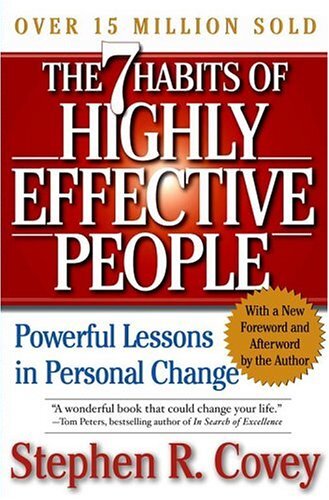Stephen R. Covey, The Seven Habits of Highly Effective People: Powerful Lessons in Personal Change, 15th Anniversary Edtion. Free Press, 2004.
- Companion volume: Seven Habits of Highly Effective People – Personal Workbook
- Sequels: The 8th Habit and The 8th Habit Personal Workbook
- Related volume: The Speed of Trust
Referenced in:
- Leadership Development Through Character Formation
- Leadership Development Through Life Effectiveness
- Empowering Leadership
LifeandLeadership.com Summary
This is a wildly popular book which has sold over 15 million copies and been translated into 38 languages since its initial release in 1989. It is based on Covey’s research into literature on success over the past 200 years. He concluded that for about 150 years before the 1920s, such literature was focused on character as the key to life effectiveness. He calls this the Character Ethic. From the 1920s until the latter half of the 20th century, however, success literature shifted the emphasis to problem-solving. Since that time and up until the early 80s, the focus was on attributes of personality, skills, and positive thinking (e.g. Dale Carnegie, Norman Vincent Peale).
In this book, Covey suggests a return to the Character Ethic, which is more foundational than all other success philosophies, and stresses traits that are universally valued by the entire human community such as moral excellence, courage, compassion, fairness, quality, and growth. This does not minimize the importance of the Personality Ethic, but labels it as secondary over against the primary traits of character out of which flow one’s personality. The chief problem with the Personality Ethic is that it attempts to create lasting change by altering outward behavior. By contrast, Covey presents an “inside out” approach to personal effectiveness.
Covey says character emerges out of our consistent life practices, or habits, and that in order to change character one must change habits. The best habits are those which facilitate a progression through three stages or “paradigms,” going from 1) dependence — where others take care of us based on our need; to 2) independence — where we make our own decisions and care for ourselves; and then to 3) interdependence — where we work with others to accomplish what we cannot on our own. The Seven Habits are Covey’s suggestions for the habits that move us along this progression. Habits 1-3 develop independence. Habits 4-6 facilitate interdependence. The seventh habit supports our capacity to do the other six. Below is a brief summary of the Seven Habits:
Toward Independence
- Habit 1: Be Proactive — Focus on those areas of life that you can indeed influence, and refrain from seeing yourself as completely under the control of your circumstances. Be proactive vs. reactive.
- Habit 2: Begin with the End in Mind — Imagine yourself at the end of your life, with what you want to have accomplished. Craft a personal mission statement that aims you in that direction.
- Habit 3: Put First Things First — Focus your time and energies on only that which fulfills your personal mission, observing good time management and life balance between producing and building production capacity.
Toward Interdependence
- Habit 4: Think win/win — Approach relationships and other commitments with the belief that you can satisfy both yours and others legitimate interests. This way everyone wins. If win/win is not possible, we should strive for the highest degree of mutuality, and certainly not fall into the reductionistic win/lose posture.
- Habit 5: Seek First to Understand, Then to Be Understood — Develop the capacity to truly listen to others’ perspectives and put yourself in their shoes.
- Habit 6: Synergize — In the relational climate created by win/win and seek-first-to-understand, value and synthesize the unique contributions each person makes to achieve a whole is greater than the sum of the parts.
Habit 7 is Sharpen the Saw, or continually improve oneself, balancing producing with improving one’s capability to produce.
It is hard to argue against the principles in this book. From a biblical perspective, one may rightly argue that change begins at an even deeper level than habits, and that changing from the inside out requires more than a paradigm shift. But provided one interprets this book through a healthy theological lens, it is not difficult at all to see the overall usefulness of this model of personal change.
From the Publisher
In The 7 Habits of Highly Effective People, author Stephen R. Covey presents a holistic, integrated, principle-centered approach for solving personal and professional problems. With penetrating insights and pointed anecdotes, Covey reveals a step-by-step pathway for living with fairness, integrity, service, and human dignity — principles that give us the security to adapt to change and the wisdom and power to take advantage of the opportunities that change creates.
About the Author
Stephen R. Covey is an internationally respected leadership authority, family expert, teacher, organizational consultant, founder of the former Covey Leadership Center, and vice chairman of Franklin Covey Co. He has made teaching Principle-Centered Living and Principle-Centered Leadership his life’s work.
Dr. Covey is the author of several acclaimed books, including The 7 Habits of Highly Effective People, which was chosen by readers of Chief Executive magazine as the number one most influential book of the twentieth century. Dr. Covey has received the Thomas More College Medallion for continuing service to humanity, the Toastmasters International Top Speaker Award, Inc. magazine’s National Entrepreneur of the Year Lifetime Achievement Award for Entrepreneurial Leadership, and several honorary doctorates. He has also been recognized as one of Time magazine’s twenty-five most influential Americans. Stephen, his wife, Sandra, and their family live in the Rocky Mountains of Utah.
***For additional information on this resource, including reviews, click the bookstore links. Check the reference at page top or the links below for resource guides on related topics.***
Related Areas
See Other Resources on Leadership Development:
See Other Resources on Leadership:
See Resources on Over 100 Ministry Topics:


